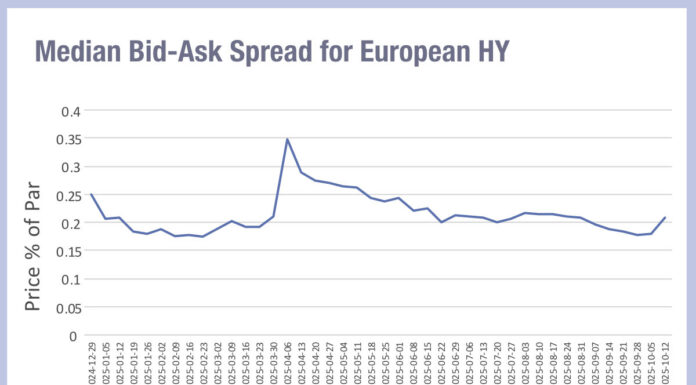This week has been very challenging for buy-side trading desks as broker-dealers struggle to price bonds, and uncertainty gripped markets.
“I was off Monday, came into the office on Tuesday, saw my traders’ faces and I asked who had died,” noted one source. “They said ‘The market.’”
Another said, “If you look at volumes on risk assets, beta instruments like ETFs, futures, have seen a liquidity spike in the sense of high trading activity, but spreads have clearly widened. Fixed income has been very illiquid, very patchy, it was even difficult to buy stuff.”
While downward pressure on financials has been a potential bonus for long-term investors looking for opportunities – one US desk observed that some regional bank bonds fell 100 basis points on Monday, then bounced back on Tuesday, “The price had gone down but bid/offers were at least 30 cents back of what you’d normally expect.”
Another head of trading said, “Liquidity defined as buying and selling at the price without moving it is not happening. You move the price more than usual, but there is a lot of trading activity.”
Screen prices were most challenged in fast moving securities, inflation-linked rates trading which lacked liquidity and of course for Credit Suisse bonds.
Credit Suisse has been on everybody’s radar, and while its decision to strengthen liquidity by a) borrowing from the Swiss National Bank (SNB); b) repurchasing senior debt securities for cash and c) making cash tender offers in relation to USD and Euro senior debt securities has given confidence to many institutional investors, there are concerns that a long term drop in the firm’s value could have too great an impact on customer confidence.
The firm’s bonds were reportedly suspended from Open Trading on MarketAxess in Wednesday’s trading, which can be triggered by high volatility in CUSIP/ISIN trading activity. MarketAxess declined to comment.
The announcement that 9.9% shareholder, Saudi National Bank, would not add to its investment on Wednesday triggered a rout in CS shares, yet one investor noted the Saudi bank’s rules prevented it from taking more than 10%, suggesting the announcement was “not news”.
“The irony of it is that it’s essentially people panicking on no new information at all,” said one trader. “Social media is rarely good for maintaining a sense of calm indifference.”
If the bank were to fail, a big ‘if’, consensus is that it would either be an orderly default, or UBS would likely step in as a buyer, which has been previously proposed, creating a very different situation to that of Lehman Brothers’ default in 2008, which occurred at a point when other banks were themselves in trouble.

“It looks like [Swiss regulator] Finra and the SNB has done enough, and we see trading is up strongly,” noted Luke Hickmore, investment director at Abrdn on morning of 16 March, who caveated that the situation was fast moving.
 Susannah Streeter, head of money and markets, Hargreaves Lansdown, wrote, “Credit Suisse is the first major bank, deemed too big to fail, to take up the offer of an emergency lifeline. The announcement that it will draw on emergency funds from the Swiss National Bank underlines how fragile the lender had become, as the withdrawal of deposits continued at pace and confidence seeped away … The US$54 billion rescue wad is staunching worries about a bigger run on Credit Suisse and the repercussions for other institutions around the world exposed to its operations. For now, the move has restored a little stability to global markets, with the S&P 500 regaining ground, once it appeared the Swiss National Bank was standing by to help. Nerves are still frayed though and that has been evident during trade in Asia.”
Susannah Streeter, head of money and markets, Hargreaves Lansdown, wrote, “Credit Suisse is the first major bank, deemed too big to fail, to take up the offer of an emergency lifeline. The announcement that it will draw on emergency funds from the Swiss National Bank underlines how fragile the lender had become, as the withdrawal of deposits continued at pace and confidence seeped away … The US$54 billion rescue wad is staunching worries about a bigger run on Credit Suisse and the repercussions for other institutions around the world exposed to its operations. For now, the move has restored a little stability to global markets, with the S&P 500 regaining ground, once it appeared the Swiss National Bank was standing by to help. Nerves are still frayed though and that has been evident during trade in Asia.”
©Markets Media Europe 2023
©Markets Media Europe 2025














